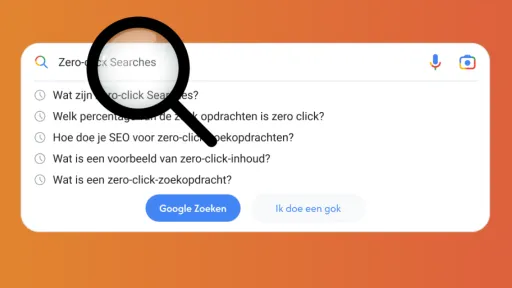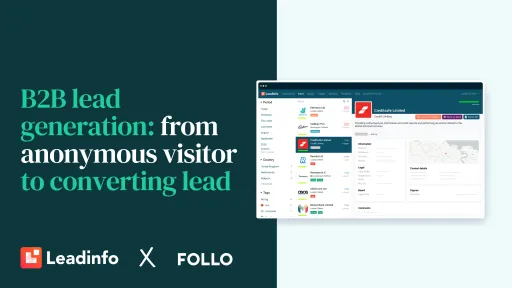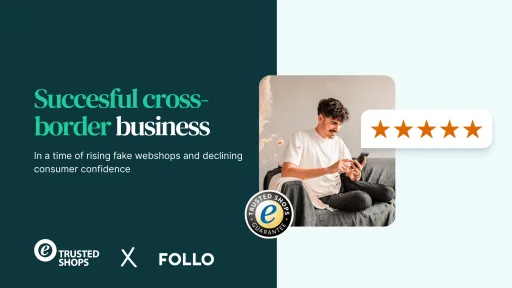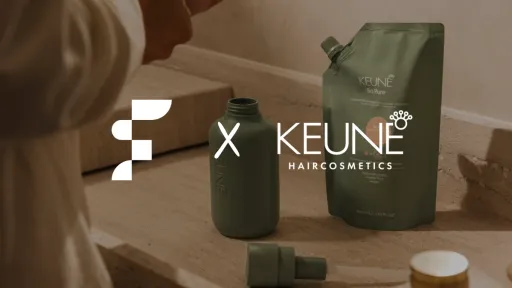Google's influence within the search engine world continues to grow, with more and more users staying within the Google ecosystem without clicking through to external websites. These so-called zero-click searches are the result of changing search behavior: people want direct answers without further clicking. Google responds to this with features like featured snippets and knowledge panels, which often provide the answer on the search results page.
These changes have major implications for companies that rely on organic search traffic. As Google increasingly provides answers on the search results page, external websites have fewer opportunities to attract traffic. In this article, we discuss recent developments and how companies can increase their visibility amid these changes.
Sparktoro research: Google keeps more traffic within its own ecosystem
According to research by Rand Fishkin of SparkToro, in collaboration with Datos, Google is sending fewer users to websites not directly related to Google. In Europe, nearly 60% of all searches result in a zero-click. This means the user doesn't click anywhere after performing a search.
Of those clicks (approx. 40%), nearly 75% go to organic search results, 24% are directed to Google-related products like Google Maps, Google Shopping, and YouTube. Only 1.5% of clicks go to ads, with ad blockers possibly playing a role in these low numbers. Although the European Union's Digital Markets Act seems to have some influence on this trend, the impact is still smaller than hoped.
How the Digital Markets Act affects Google's search results
The Digital Markets Act (DMA) is European legislation aimed at creating fair and accessible markets in the digital sector. The law is intended to regulate large digital platforms, also known as "gatekeepers." These gatekeepers, like Google (Alphabet), have the power to act as gatekeepers between businesses and consumers due to their dominant position, which could lead to competition distortion.
A major concern for the European Commission is that Alphabet (Google's parent company) might favor its own services, such as Google Shopping, Google Flights, and Google Hotels, in search results at the expense of competing services. This phenomenon is known as self-preferencing. In response, Google has removed or adjusted some features in the search engine in Europe. The Commission is currently investigating whether the measures taken are sufficient. So far, the impact of this regulation seems limited in the search results, and there are concerns that Alphabet still prioritizes its own products despite the DMA's regulations.
Our approach: Increasing visibility in the era of Zero-Click Searches
Zero-click searches are becoming increasingly dominant, making it crucial to increase your visibility in innovative ways. Our approach focuses on leveraging various SERP features, such as People Also Ask sections, featured snippets, and organic shopping feeds. Through strategic analyses and smart optimizations, we ensure your business remains visible even when users don't click through. Here you can read how we can strengthen your online presence in the era of zero-click searches.
People Also Ask (PAA) Analysis: Your chance for more visibility
The People Also Ask (PAA) section in Google, also known as "More to ask," is a dynamic block on the search results page (SERP) where Google shows related questions users might also ask. This block not only provides extra information to searchers but also contributes to the visibility and findability of websites appearing in this section. Securing a spot in these PAA blocks increases the chance that your content will be seen by more people.
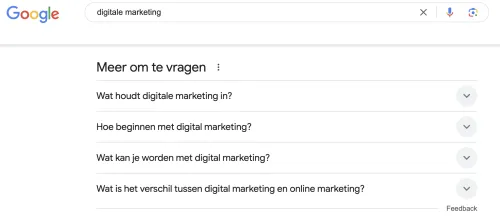
With our PAA Analysis, we can optimize your content for a position in the PAA section. It's important to understand which questions are being asked and how you can anticipate them with valuable answers. This starts with analyzing relevant keywords and questions appearing in the PAA blocks. Through Python scripting, we can scrape the PAA blocks for specific keywords, gaining insight into which questions are being asked, who answers them, and which answers are currently being shown.
We can then have AI-enhanced answers written based on the current answers. With SEO guidelines and targeted prompts, the content can be further optimized to be both substantively strong and technically well-structured for the PAA section. Adding these improved answers to your own content increases the chance of claiming PAA blocks.
Featured Snippet Analysis: Top of search results without clicks
A featured snippet is the block that appears at the top of search results and directly answers a user's search intent. This block generates a lot of visibility because it is displayed above regular search results and is often seen as the most reliable answer to a question. Featured snippets play an important role in zero-click searches because users often find the answer without further clicking, keeping them within the search engine.
Featured snippets exude expertise and authority. Websites that manage to appear in this block position themselves as a reliable source. Especially for informational searches – like “how does X work” or “what is Y” – featured snippets are common. This makes it an excellent opportunity for companies to optimize their blogs and explanatory content for this type of search queries.

With our Featured Snippet Analysis, we help you optimize for featured snippets. For effective snippet optimization, it's important to gain insight into current featured snippets and competition. We do this with Python scripts, scraping the snippets for relevant keywords, so you gain insight into existing answers, competitors, and the number of impressions. We then generate AI-enhanced answers based on current content and optimized SEO guidelines. We add this optimized content to your website, significantly increasing the chance of a featured snippet.
Organic Shopping Analysis: More visibility for your products in Google
In the world of e-commerce, zero-click searches also play an increasingly larger role, especially due to the prominent placement of shopping cards, product carousels, and other visual shopping features in Google. These elements give users direct access to product information, prices, and images without having to click through to a specific website. For retailers, this offers opportunities to be directly visible, but it also means that initially, less traffic goes to their own webshops. Optimizing your shopping feed is therefore crucial to ensure your products stand out among the many others in these zero-click environments.
The organic shopping analysis (Increase part of Follo) starts with uploading the shopping feeds into a data warehouse, where all first-party data of the company is combined. This means product data is combined with valuable information such as search terms from Google Search Console (GSC). These search terms are then run through the feed to check which relevant keywords are missing in the product titles or descriptions.
Next, it is determined whether a search term is relevant to the product. If so, the product is adjusted and automatically imported into Channable, a tool for feed management. This process is automated on a daily or weekly basis, with Channable automatically processing the output of the analysis and optimizing the shopping feed. This leads to continuous, automatic optimization of the shopping or marketplace feed, making products more visible in organic shopping results.
The result of this approach is a dynamic and optimized shopping feed that is continuously updated based on current search data and product information. This keeps your products visible and competitive in an environment increasingly focused on zero-click interactions and quick access to product information.
SEO Intelligence Dashboard: Insight into your actual organic market share
With our SEO Data Intelligence Dashboard, we offer a unique insight into what Google knows. The dashboard shows you how your website performs compared to your competitors, on every important keyword and for every SERP feature in your market.
With this technique, we can provide in-depth insights that go beyond the basics of SEO. This includes information about which questions are important in your market, how many visual elements appear in the top 10 search results, the influence of video on your SEO performance, and whether Google is increasingly developing into an e-commerce platform in your sector.
Using proprietary SEO data, we offer insights that your competitors don't have. Old rankings are replaced by data about your real organic market share. With this, you can:
- Track the actual market share of your domain and that of your competitors.
- Track market shares per specific cluster, such as product categories (for example, "rugs" or "outdoor rugs") and features like color, size, shape, or target audience.
- Monitor the development of market shares over time and see who the winners and losers are in your market.
Additionally, the dashboard provides detailed information about the most prominent SERP features in your market, such as:
- People Also Ask (PAA)
- Videos
- Images
- Product results, and more.
You can precisely track which SERP features take up the most space in search results and whether their importance is increasing or decreasing over time. With the SEO Intelligence Dashboard, you gain insights that go beyond traditional SEO analysis and can develop data-driven SEO strategies that truly impact your visibility and market share.
Stay visible in a world of Zero-Click Searches
Zero-click searches pose an increasing challenge for companies relying on organic search traffic. Google increasingly provides the answers itself, resulting in fewer clicks to external websites. However, companies can increase their visibility by smartly using SERP features like featured snippets, People Also Ask sections, and organic shopping feeds. Using tools like our SEO Intelligence Dashboard also offers strategic advantages in an increasingly competitive search landscape.
Curious how your company can respond to the trend of zero-click searches? Contact us for a People Also Ask or Featured Snippet Analysis, or schedule a free consultation. Discover how our tailor-made SEO strategies can increase your online visibility and help your business remain more visible in the changing search engine landscape. Take the first step towards more success and higher conversions today!
